Black LGBT Health in the United States
Black LGBT Health in the United States
The Intersection of Race, Gender, and Sexual Orientation
Edited by
Lourdes D. Follins and Jonathan M. Lassiter
Lexington Books
Lanham Boulder New York London
Published by Lexington Books
An imprint of The Rowman & Littlefield Publishing Group, Inc.
4501 Forbes Boulevard, Suite 200, Lanham, Maryland 20706
www.rowman.com
Unit A, Whitacre Mews, 26-34 Stannary Street, London SE11 4AB
Copyright 2017 by Lexington Books
All rights reserved . No part of this book may be reproduced in any form or by any electronic or mechanical means, including information storage and retrieval systems, without written permission from the publisher, except by a reviewer who may quote passages in a review.
British Library Cataloguing in Publication Information Available
Library of Congress Cataloging-in-Publication Data
Names: Follins, Lourdes Dolores, editor. | Lassiter, Jonathan, editor.
Title: Black LGBT health in the United States : the intersection of race, gender, and sexual orientation / edited by Lourdes D. Follins and Jonathan Lassiter.
Description: Lanham : Lexington Books, 2016. | Includes bibliographical references and index.
Identifiers: LCCN 2016041508 (print) | LCCN 2016047826 (ebook) | ISBN 9781498535762 (cloth : alk. paper) | ISBN 9781498535779 (Electronic)
Subjects: LCSH: Sexual minoritiesMedical careUnited States. | African American gaysUnited States. | GaysMedical careUnited States. | BisexualsMedical careUnited States. | TranssexualsMedical careUnited States. | HomosexualityUnited States.
Classification: LCC RA564.9.S49 B53 2016 (print) | LCC RA564.9.S49 (ebook) |
DDC 362.1086/640973dc23
LC record available at https://lccn.loc.gov/2016041508
 The paper used in this publication meets the minimum requirements of American National Standard for Information SciencesPermanence of Paper for Printed Library Materials, ANSI/NISO Z39.48-1992.
The paper used in this publication meets the minimum requirements of American National Standard for Information SciencesPermanence of Paper for Printed Library Materials, ANSI/NISO Z39.48-1992.
Printed in the United States of America
I dedicate this book to all of the power-filled, passionate, and steadfast young LGBTQ/SGL young people of color who I worked with as a psychotherapist and who I have had the honor of interviewing as a researcher. If it wasnt for them, I would not be the kind of woman I am today.
Lourdes Dolores Follins
This book is dedicated to all us Black same-gender-loving and trans people who continue to live our lives with dignity in the face of constant oppression that seeks to destroy us. I will continue to tell our stories. This book is also dedicated to my mother, Joyce Annette Lassiter, and father, John Mathis Lassiter, Jr., whose strength, sacrifice, and love keeps me striving to make the world a better place.
Jonathan Mathias Lassiter
Contents
Jonathan Mathias Lassiter
Amorie Robinson
Jonathan Mathias Lassiter
H. Sharif Herukhuti Williams
Della V. Mosley, Roberto L. Abreu, and Candice Crowell
Tonia C. Poteat and Lourdes Dolores Follins
Siobhan Brooks
LaShaune P. Johnson and Jane A. McElroy
Dante D. Bryant
Rahwa Haile, Mark B. Padilla, and Edith A. Parker
Tfawa T. Haynes and Sannisha K. Dale
Lawrence O. Bryant
Kasim Ortiz, Angelique Harris, Kenneth Maurice Pass, and Devon Tyrone Wade
LGBT individuals (Burwick, Gates, Baumgartner, & Friend, 2014). In fact, while some Black LGBT individuals benefit from these changes, many members of these communities still face disproportionate risks to their physical and mental health. Despite marriage equality, Black female same-sex couples report household median incomes $20,000 less than Black male same-sex couples and are less likely to have health insurance compared to their Black different-sex counterparts (Kastanis & Gates, 2013). When compared to LGBT individuals of other ethnoracial backgrounds or heterosexuals of any ethnoracial group, Black LGBT individuals rate higher on measures of psychological distress, perceived stress, and co-occurring disorders (Balsam, Molina, Beadnell, Simoni, & Walters, 2011; Hughes, Matthews, Razzano, & Aranda, 2003; ODonnell, Meyer, & Schwartz, 2011); have fewer financial resources (Kastanis & Gates, 2013); suffer higher mortality rates from diseases such as breast cancer, heart disease, diabetes, and HIV/AIDS (Institute of Medicine [IOM], 2011; Millet, Peterson, Wolitski, & Stall, 2006); have higher rates of alcohol and substance use in response to stress, and report greater concurrent discrimination based on gender, race, and sexual orientation (Balsam et al., 2011; Fredriksen-Golden, Kim, Barkan, Balsam, & Mincer, 2010; Hughes, Johnson, & Matthews, 2008).
In spite of this, many Black LGBT individuals demonstrate resilience, which Luthar, Cicchetti, and Becker (2000) define as a dynamic process encompassing positive adaptation within the context of significant adversity (p. 543). Much of the literature on Black LGBT individuals is largely focused on the mental health of these communities (e.g., anxiety, depression, and psychological distress) and the public health issues they face (i.e., HIV/AIDS, smoking tobacco cigarettes). However, there are still knowledge gaps about the cultural realities, strengths, and protective factors of Black LGBT populations. Understanding how Black LGBT individuals overcome various biopsychosocial and spiritual barriers and lead healthy lives can help community members, researchers, and providers develop interventions and strategies to promote the growth and development of Black LGBT individuals and their communities. Utilizing both a resilience paradigm and an intersectional perspective that look for the protective factors and strengths of a community that is simultaneously impacted by multiple systems of oppression (Bowleg, 2008; Wong, 2011) offers providers and researchers more options for how to work with Black LGBT individuals and their loved ones.
In order to expand the conversation about Black LGBT health in the United States, this book is the first published text that solely focuses on the health of Black LGBT people. What also makes this text unique is that the authorseither in their chapters or in conversation with other chaptersdescribe both the risk and protective factors of these communities. More often than not, the LGBT health empirical and theoretical literature either refers to the healthcare needs of Black LGBT populations as an aside, utilizes very small samples of Black LGBT individuals (<30 percent; Moradi, DeBlaere, & Huang, 2010), or examines the behaviors that place Black gay and bisexual men and Black transwomen at risk for contracting HIV (Huang et al., 2009). As a result, one could assume that the health and healthcare needs of these populations are the same as the larger LGBT population, or worse, that HIV is the primary healthcare concern facing Black LGBT communities. In order to address this myopic approach, each chapter of this book is written from the vantage point that the intersectionality of anti-Black racism, heterosexism, homonegativity, biphobia, transphobia, and social class significantly and simultaneously impacts the lives and hence, the health of Black LGBT people (Bowleg, 2008; Follins, Walker, & Lewis, 2014).
In addition, this book will provide readers with both empirical research and insightful analyses about the protective factors that enhance the health of Black LGBT people as well as the various risk factors that negatively impact the lives of Black LGBT people. This book also goes beyond a Black LGBT 101 in that it is assumed that the audience already has some familiarity with theories related to intersectionality, LGBT identity development, racial socialization, racial identity, and gender identity. This book also attempts to fill in the gaps by providing information about the health of subpopulations about which we know the least: Black bisexual-identified women, Black bisexual-identified men, and Black transgender men. Another aspect of this book that makes it stand out is the commitment to including the work of Black LGBT researchers and providers who are up-and-coming alongside those who are known in their fields. It has increasingly become commonplace for edited volumes of LGBT health and governmental reports about LGBT health to be comprised of the originators of the field, who tend to be older White men and others who may or may not be LGBT (see IOM, 2011; Makadon, Mayer, Potter, & Goldhammer, 2015; Meyer & Northridge, 2007 for examples). The editors wanted to give readers an opportunity to discover the work of Black LGBT researchers and providers who are newer and lesser-known.
Next page
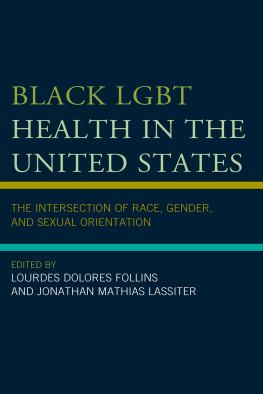

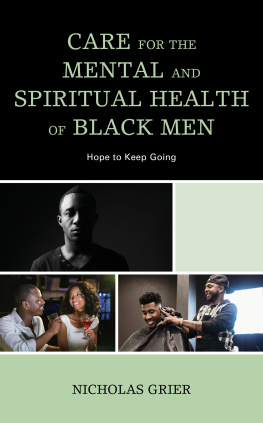
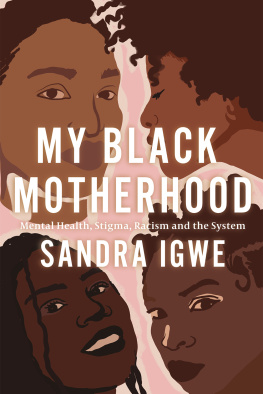
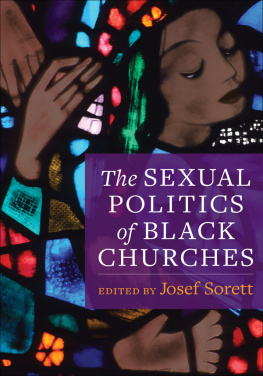
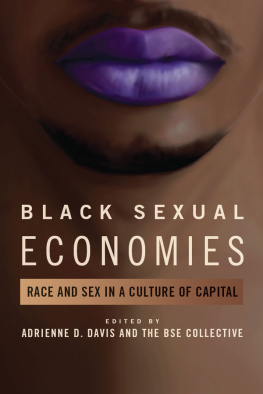
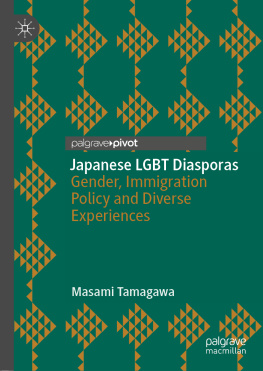
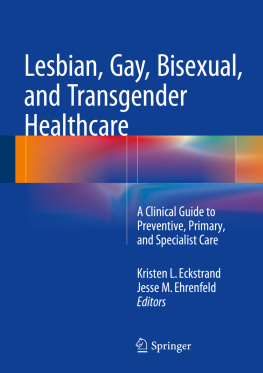
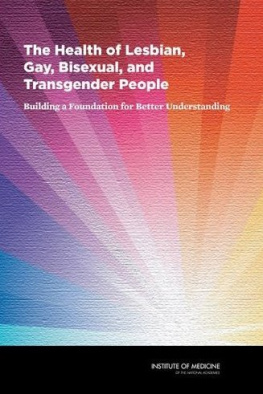
 The paper used in this publication meets the minimum requirements of American National Standard for Information SciencesPermanence of Paper for Printed Library Materials, ANSI/NISO Z39.48-1992.
The paper used in this publication meets the minimum requirements of American National Standard for Information SciencesPermanence of Paper for Printed Library Materials, ANSI/NISO Z39.48-1992.